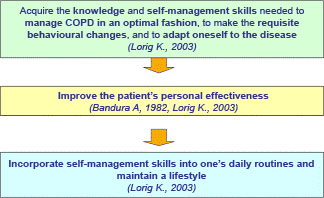
Step 2
Self-management program
Self-management
Self-management is a key component of pulmonary rehabilitation. Self-management programs aim to help patients take charge of their pulmonary health by making changes to their lifestyle and by managing their chronic pulmonary disease in an optimal fashion. Although the term "self" implies "alone", the self-management component always includes a partnership with a health care professional.
For a self-management program to work well, it must simultaneously include an educational/behaviour change dimension and functional links with the health care system.
Please take a look at this scientific reference document regarding the effectiveness of self-management: Promoting effective self-management programs to improve COPD
The following diagram illustrates the goals that the patient is seeking to achieve:
Self-management of COPD

(Source: Diane Nault; COPD Management according to the Chronic Care Model: the Quebec experience.)
The skills
The "education" component is vital to enable the patient to acquire the knowledge and develop the self-management skills so as to better take charge of their disease. However, such learning must not be limited to just acquiring knowledge.
This educational experience must also:
- serve to boost the patient's self-confidence
- enable them to better take charge of their disease, and this, thanks to preventative actions, the daily management of symptoms and the adoption of a healthy lifestyle
This education cannot happen without the participation of a skilled educator.
To be an effective educator, the health care professional must:
- properly understand adult learning principles and integrate them into their practice
- help motivate the patient and ignite their desire to change
- be aware of the learning needs of the patient and of their family
- determine realistic targets and goals with them
- plan adequate interventions and put them into practice
- evaluate and encourage positive results
Recommendations from the Canadian Thoracic Society (CTS)
The Canadian Thoracic Society (CTS) recommends that a pulmonary rehabilitation program include an education program designed to develop the patient's self-management skills and that includes the following elements:
- Advice on how to stop smoking
- Basic information on physiopathology
- Information on medication and techniques for using inhalators
- Self-management (problem resolution, decision making, action)
- Strategies to control shortness of breath
- Action plan for the early treatment of severe exacerbations
- End-of-life decision making
- Identification of educational resources

